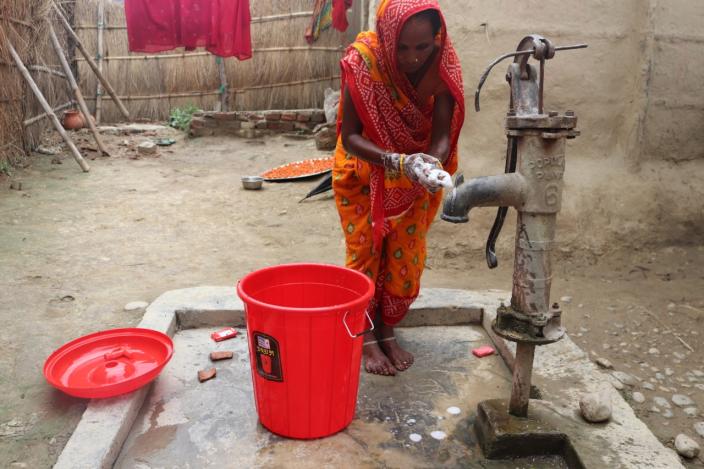What is COVID-19?
Coronaviruses are a large family of viruses that are known to cause illness ranging from the common cold to more severe diseases such Severe Acute Respiratory Syndrome (SARS). COVID-19 is a new strain of coronavirus that has not been previously identified in humans. The main source of the outbreak is still unknown but, considering previous experiences of coronavirus, it is most likely that the virus made inter-species jump to humans from animals.
The COVID-19 pandemic was first identified in Wuhan, Hubei, China in December 2019. On 30 January 2020, World Health Organization (WHO) announced that COVID-19 outbreak was a Public Health Emergency of International Concern and on 11 March, WHO declared the situation as pandemic. As of 15 July 2020, cases of COVID-19 has been reported in 215 countries (Source). WHO’s situation reports of 15 July 2020 shows that virus has globally affected 12,964,809 people and have resulted in the deaths of 570,288 people. In South-East Asia region alone, it has affected 1,196,651 people and led to deaths of 29,900 people.
How it is affecting Nepal?
Nepal was identified as one of the high-risk countries as it shares multiple open borders with neighboring countries India and China. Along with this, Nepal’s health infrastructures are also very limited. Ministry of health and Population of Nepal has reported that as of 15 July 2020, there are 17,061 confirmed cases in Nepal, out of which 10,328 has recovered and 38 people have lost their lives.
Government of Nepal decided on nationwide lockdown from 24 March, which was extended time and again as a preventive measure. Nationwide lockdown has now been partially lifted effective from June 10. Ministry of Health and Population (MoHP) is closely working with concern ministries and agencies to prevent further effects of Covid-19 virus in Nepal. The government of Nepal along with provincial and local government has taken various precautionary measures to prevent the spread of virus.
How is Oxfam responding in Nepal?
Oxfam has declared this emergency a Cat -1 emergency and will focus globally on its core mandate: Water, Sanitation and Hygiene (WASH) and Shock Responsive Social Protection (SRSP) bringing attention to the differential vulnerabilities of women and other marginalized groups and preventing inequalities to grow through this pandemic.
Oxfam is deeply concerned about how the poorest and most vulnerable people will be hit by the coronavirus –at home and in places where there isn’t much protection from it spreading, medical care for people who are sick, or ways to deal with the loss of income.
Drawing on learning from Oxfam’s responses to public health emergencies with a strong community engagement component, in combination with existing knowledge and expertise in gender, public health promotion, water and sanitation, community-based protection and interpersonal communication and digital technology, we will work to ensure that poor, vulnerable and marginalized people are protected against the impacts of COVID-19. We will engage with and support communities, with a focus on women and vulnerable groups (elderly, person with disability, marginalized minorities). Using a flexible approach to ensure that our support will be both preventive and responsive to evolving communities' needs.
Oxfam in Nepal with support from local partners is raising awareness amongst community people about the prevention of virus. Various Information, Educational and Communication materials in line with government is being distributed. Miking of the messages in the communities is being done for sensitization along with dissemination of messages through radio jingles and public service announcements in local languages.
In collaboration with local partners, Oxfam also distributed hand hygiene products and Personal Protective Equipment at the municipality level to further support health posts, isolation centers, quarantine centers and security agencies. Below infograph presents the information as of 24 June 2020.
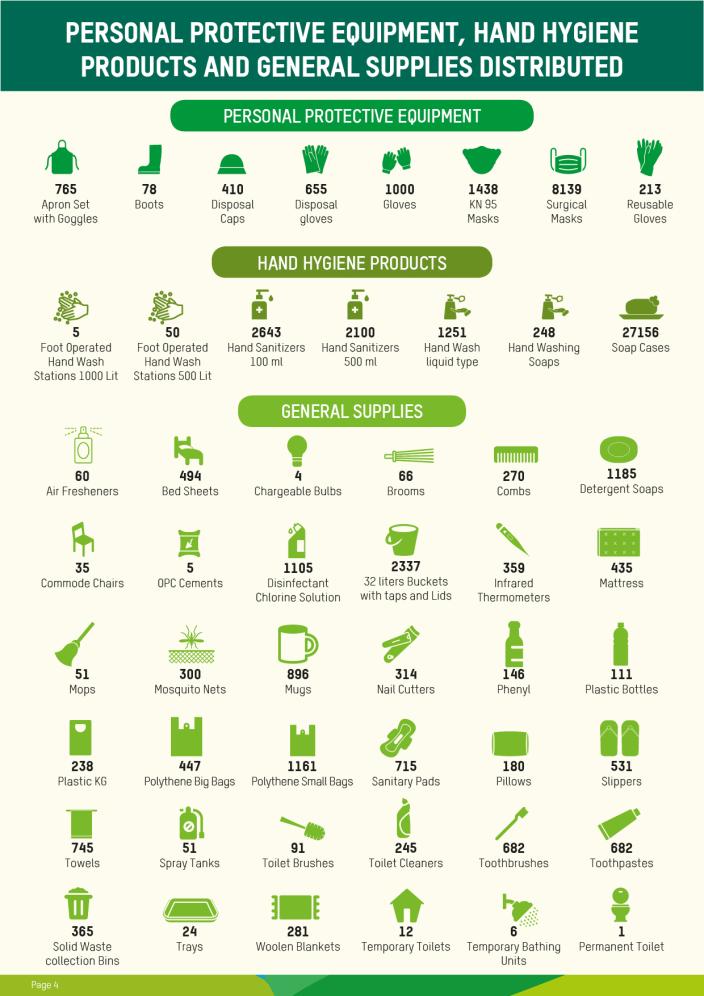
In Kanchanpur:
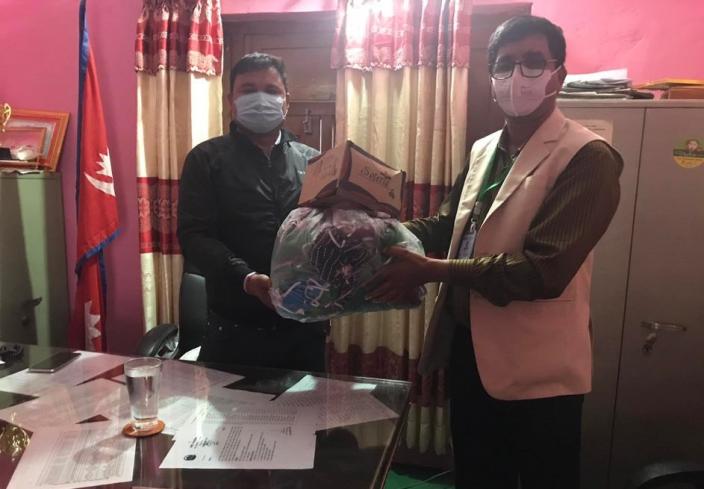
Oxfam in Nepal through local partner National Environment and Equity Development Society (NEEDS) who is currently implementing Transboundary Rivers of South Asia (TROSA) project in Kanchanpur supported local government and District Disaster Management Committee (DDMC) with various essential Personal Protective Equipment such as mask, gloves, N95 mask for volunteers, digital thermometer and Hand hygiene items such as handwash liquid, Soap, Sanitizer, Bucket with tap, Flex, .
The products were handed over by NEEDS to municipalities such as, Belauri, Punarbas, Bhimdatta, Mahakali, Beldandi, Shuklaphant, Krishnapur, Laijhadi and Bedkot for further distribution to health posts, check points, etc.
In Sarlahi:
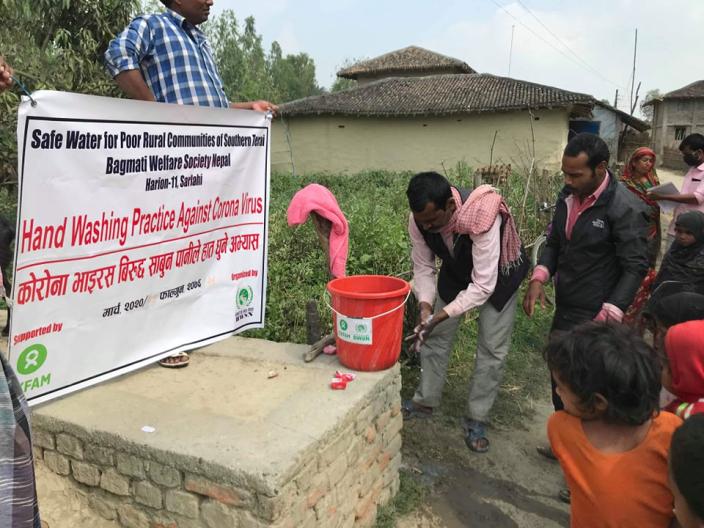
Oxfam in Nepal with support from local partner Bagmati Welfare Society Nepal (BWSN) carried out “Hand Washing Against Coronavirus Transmission” awareness campaign Haripur Municipality, ward no.9, Pidari and Hariyon Municipalities in Sarlahi[BD1] . A campaign aimed at raising awareness amongst the community people about importance of proper ways of regular handwashing and usage of facemask. The campaign was carried out in different junctions and bazaars within the municipalities.
Pamphlets and poster with the message on prevention from the transmission of virus was also distributed for mass awareness.
In Rautahat:
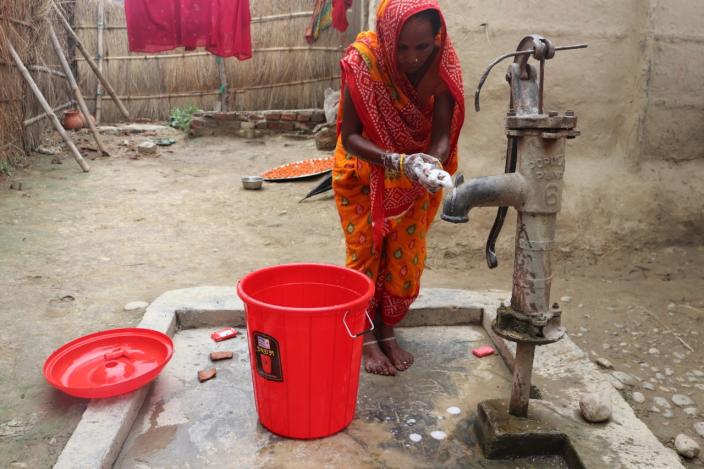
Oxfam in Nepal’s local partner Rural Development Center (RDC) who is currently supporting Oxfam in implementing Safe Water project carried out mass communication activity on the awareness about COVID-19 through miking on important messages and information regarding safe water and ways to prevent the transmission of virus. The miking was done in six clusters of Rajpur Municipality of Rautahat; Goth, Gardhwa, Butahi, Digaha, Hajminiya and Islampur.
The following vital messages were disseminated:
- Water is life, if it is clean
- Use clean water
- Make water safe by proper treatment and storage
- Save clean water
- Five key messages disseminated were:
- Wash hands regularly for 20 seconds following proper steps of handwashing.
- Use mask
- Avoid crowded areas
- Avoid handshakes
- Stay at least 1metre away from another person
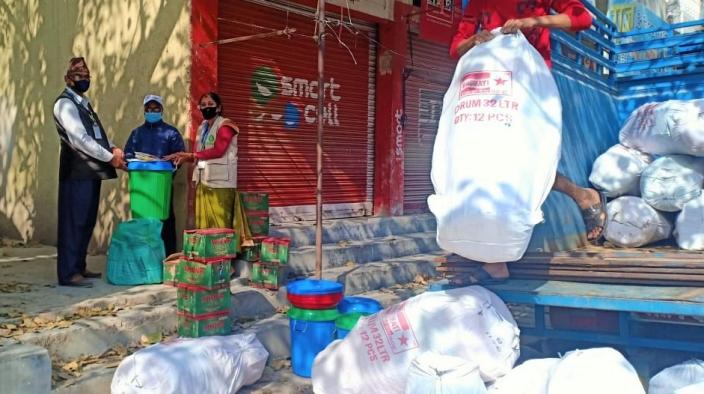
Oxfam’s implementing partner RDC Nepal supported local government and District Disaster Management Committee (DDMC) with Personal Protective Equipment and hand hygiene products such as Sanitizers, Soaps, Buckets with taps, were distributed 2 April 2020. These products were distributed to Rajdevi and Gaur municipalities by DDMC with support from RDC. The communities in Rajdevi and Gaur municiplaities were also directly supported with hand hygiene products by RDC.
Communities were yet again demonstrated handwashing techniques to promote hand hygiene as prevention measure.
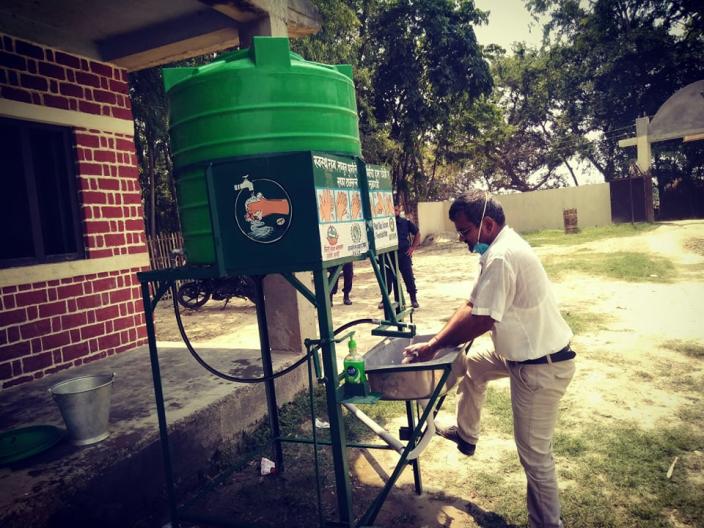
Oxfam in Nepal in coordination with local partners have installed 24 contactless foot operated handwashing stations with regular supply of water, hand washing liquids and sanitizers (for three months) in different quarantine centers of Rautahat and Sarlahi districts of Nepal to respond for preparedness against possible outbreak of COVID-19. Two users can use the handwashing station at the same time which also has child friendly access. Message on handwashing is displayed at the station for mass awareness. Health workers are oriented on hand hygiene by local partners to further disseminate messages to people staying at the centers. Oxfam has been supporting altogether 55 quarantine centers in Rautahat and Sarlahi districts.
How to reduce the risk of Infection?
- No matter where we are, we can all minimize the risk by practicing good hygiene:
- Wash your hands regularly with soap and water/hand sanitizers.
- Cough and sneeze into tissues or into a flexed elbow.
- Avoid touching your eyes, nose and mouth.
- Wash food before eating and avoid raw or uncooked food.
- Avoid using public transport if you do develop symptoms of the flu.


Please check out the dedicated website for COVID-19 information created by Minstry of Health and Population.
Also, learn about the facts and mythbusters here.
How do we protect the health and security of our staff?
Oxfam in Nepal started its preparedness activities by putting Standard Operating Procedures (SOP) and good hygiene in the workplace. A taskforce was formed to ensure that all the staff were properly oriented about the virus and the ways of transmission. To minimize the transmission, important mechanisms were put into place; Strictly following the travel advisory, Personal precaution, Office precaution, Accommodation precaution, Vehicle precaution and numerous do’s and don’ts were followed as guided by the Government of Nepal.
Five important rules were immediately put into practice
- Properly and recurrently washing hands and applying hand sanitizers frequently.
- Avoiding touching facial areas.
- Keeping one-meter distance between people, and doing Namaste to greet
- Using tissue or covering with elbow while coughing and sneezing
- Staying at home if anyone had any flu-like symptoms (running nose, headache, muscle ache, cough, sore throat, temperature).
You can help Oxfam save lives
In the face of global pandemic, it does not matter where we come from, what language we speak, or our cultural background. COVID-19 reminds us that we all deserve to be treated equally and have the same basic rights.
When an emergency happens, Oxfam is ready to respond. We work with our partners on the ground to save lives and reduce future risks. With your support, we help make sure that people who have lost everything have access to immediate life-saving essentials.
